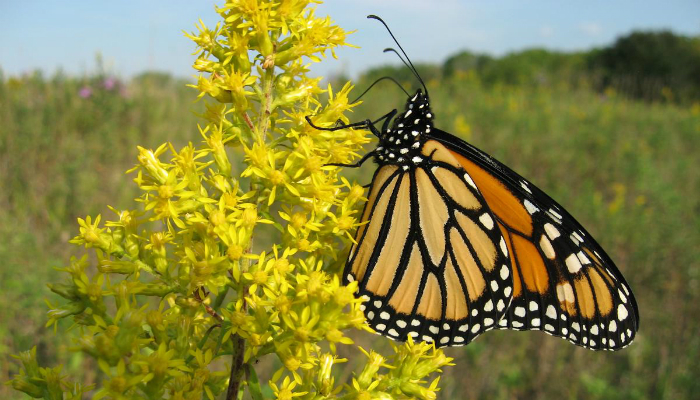Land Trust Alliance Blog: Land Trusts can help protect pollinators

The Land Trust Alliance is a great resource in keeping up to date on land trust initiatives throughout the country. Here’s a great article, written by Val Dolcini, president and CEO of the Pollinator Partnership, a nonprofit organization dedicated exclusively to the protection and promotion of pollinators and their ecosystems, about what land trusts can do to help pollinators, but it’s also a reminder that individually we can help these important species.
The monarch butterfly and its spectacular 3,000-mile migration — from Mexico, throughout the American Midwest, to Canada — is in great jeopardy. In 2014, the U.S. Fish and Wildlife Service was petitioned to protect the monarch butterfly under the Endangered Species Act, and a listing decision may come by summer 2019.
Supporting the fragile migration of this iconic species lies within our ability to create and maintain adequate habitat with nectar resources to fuel the journey and milkweed plants to house the eggs. Pollinator Partnership (P2) is taking action by joining forces with a variety of non-governmental organizations, land grant universities, and state and federal agencies along the migration route who are determined to strengthen and support the extraordinary natural phenomenon.
There is a real opportunity for land trusts to help. Simply planting milkweed and other native nectar plants will fuel the monarch for its incredible journey. Restoring habitat on former industrial sites and making greater use of managed corridors like utility ‘rights-of-way’ are two ways to increase fuel stations for the pollinator. Restored and natural lands managed by land trusts across the Midwest, as well as promoting habitat on working agriculture lands could also play a valuable role in monarch conservation.
P2 has partnered with others to form Monarch Wings Across the Eastern Broadleaf Forest, a five-state effort designed to secure long-term monarch habitat. The project goals are to increase the amount of regionally appropriate native seed and provide technical training to landowners and managers throughout the project region (Illinois, Indiana, Ohio, Missouri and Arkansas). Some participants may qualify for a free onsite habitat review by P2’s monarch habitat coordinator. The monarch habitat technical training courses will open this spring. Visit http://pollinator.org/mwaebf for more information.
Originally published on the LTA blog.


